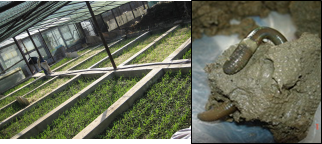Soil Bio-interaction and Soil Ecosystem Function
Our group focuses on soil ecosystem structure and function in a changing word influenced by the anthropogenic and natural disturbances. The research priorities included: Soil biodiversity pattern with molecular methodology and their response to human interventions; Biotic interactions in particular Soil microbes-fauna interactions in ecological processes; Restoration of soil function and community following disturbances; Applying bio-resource and beneficial microbe and fauna to promote soil health and food quality and soil bioremediation, as well as herbivory linkages between aboveground and belowground systems under agricultural management and climate change. Overall, the ultimate goal of our study is to mechanically understand and practically apply our knowledge to promote soil ecosystem functionality and ecosystem sustainability by manipulating soil biota.
Selected Publications:
1. Huang, J., Liu, M., Chen, F., Griffiths, B.S., Chen, X., Johnson, S.N., Hu, F., 2012. Crop resistance traits modify the effects of an aboveground herbivore, brown planthopper, on soil microbial biomass and nematode community via changes to plant performance. Soil Biology & Biochemistry, 49: 157-166.
2. Tao, J., Xu, Y.J., Griffiths, B.S., Hu, F., Chen, X.Y., Jiao, J.G., Li, H.X., 2011. Earthworms reduce the abundance of nematodes and enchytraeids in a soil mesocosm experiment despite abundant food resources. Soil Science Society of America Journal, 75: 1774-1778.
3. Zhang, S.J., Hu, F., Li, H.X., Li, X.Q., 2009. Influence of earthworm mucus and amino acids on tomato seedling growth and cadmium accumulation. Environmental Pollution, 157: 2737-2742.
4. Tao, J., Chen, X., Liu, M., Hu, F., Griffiths, B., Li, H., 2009. Earthworms change the abundance and community structure of nematodes and protozoa in a maize residue amended rice-wheat rotation agro-ecosystem. Soil Biology & Biochemistry, 41: 898-904.
5. Mao, X.F., Hu, F., Griffiths, B., Chen, X.Y., Liu, M.Q., Li, H.X., 2007. Do bacterial-feeding nematodes stimulate root proliferation through hormonal effects? Soil Biology & Biochemistry, 39: 1816-1819.
6. Mao, X., Hu, F., Griffiths, B., Li, H., 2006. Bacterial-feeding nematodes enhance root growth of tomato seedlings. Soil Biology & Biochemistry, 38: 1615-1622.

